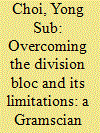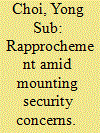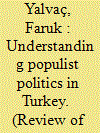| Srl | Item |
| 1 |
ID:
174561


|
|
|
|
|
| Summary/Abstract |
Colonialism affects post-colonial social formations in a variety of ways. Japanese colonial rule had a far-reaching influence on South Korean post-colonial social formation. Most legacies of colonialism diminished as time went by, but one legacy of colonialism continued or even increased its effects on the South Korean political economy from the 1960s – namely, the division of Korea. This article provides an alternative Gramscian approach to the analysis of the social formation of South Korea, with due consideration of the division of the peninsula. For that purpose, it introduces the concept of a division bloc, adapting Gramsci’s concept of a historical bloc to develop an analysis of a social formation that is unique to South Korea. Then, I explicate the two events that have been most damaging for the division bloc – the 1997 economic crisis and the 1998–2007 inter-Korean reconciliation – describing them as an organic crisis and a hegemonic project, respectively. Following this, I present reasons why the counter-hegemonic efforts of liberal nationalists to overcome the division bloc failed.
|
|
|
|
|
|
|
|
|
|
|
|
|
|
|
|
| 2 |
ID:
166010


|
|
|
|
|
| Summary/Abstract |
The 1998–2007 inter–Korean reconciliation was paradoxical because there were aggravating military tensions during the same period. To solve the security puzzle, this paper employs a Gramscian approach and argues that the reconciliation was pursued as hegemonic projects by the ruling political groups in North and South Korea. In South Korea, the economic crisis in 1997 led counter-hegemonic liberal nationalists to take political power, and the new ruling political group implemented the engagement policy toward Pyongyang to attain hegemony. In North Korea, the existing ruling political group sought to reconcile with Seoul, mostly for material gains to maintain hegemony by stopping the ongoing economic crisis from developing into a political crisis without a full–scale reform of the system. In the process, each capitalized on unication nationalism, which had a strong national– popular force because of the division of Korea. The rapprochement was carried out primarily to exhibit their contributions to unication, which could be signicantly conducive to their winning the domestic struggle for hegemony.
|
|
|
|
|
|
|
|
|
|
|
|
|
|
|
|
| 3 |
ID:
168876


|
|
|
|
|
| Summary/Abstract |
The aim of this article is to understand populism as a hegemonic project involving a struggle for power between different social forces. We take a critical realist approach in defining populism. This implies several things. We develop a new approach to understanding populist politics by taking neither a purely discursive (Laclau), nor a solely structural (Poulantzas), but a critical realist approach and analysing the three-way relationship between structural conditions, agency, and institutional framework. Second, it implies that populist politics is composed of complex and often contradictory dynamics and emergent features involving mainly domestic but also international processes. We develop this through a combination of three concepts – passive revolution, hegemonic depth, and partial hegemony. These indicate how a hegemonic project is situated in deeper social relations and how hegemonic leadership responds to this. We take the policies of AKP government in Turkey as a case in populist hegemonic project. We demonstrate that AKP has followed different hegemonic projects during its rule changing from an initial majoritarian populist politics to one of neoliberal authoritarian populism as it has consolidated its hegemonic depth. These different populist projects involve alternative visions of Turkey but are nevertheless all compatible with a global neoliberal agenda.
|
|
|
|
|
|
|
|
|
|
|
|
|
|
|
|